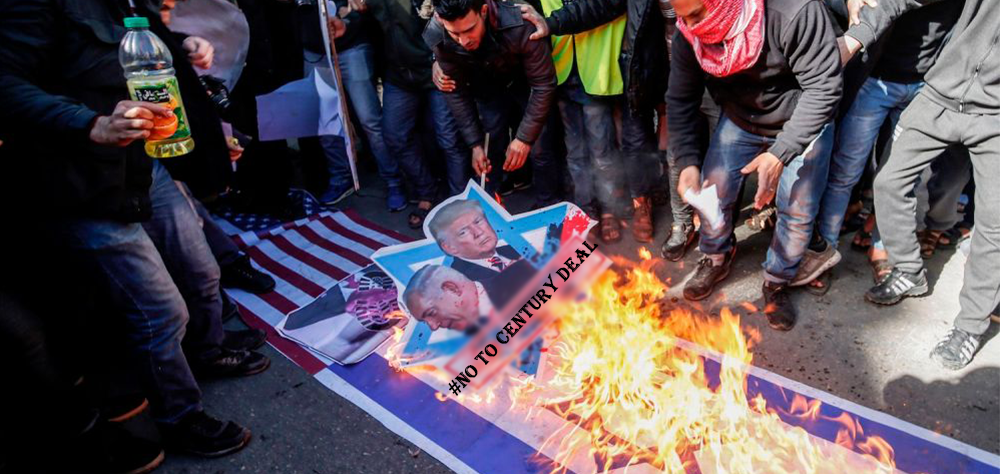Alwaght- Recently, Jordan hosted a meeting to discuss ways to promote comprehensive compromise and peace in the region. The meeting was attended by the foreign ministers of Jordan, Egypt, France, Germany (virtual meeting) and a representative of the European Union, without the presence of a representative from the United States. The meeting was aimed at exploring ways to support the Middle East peace process and ways to support the peace process between the Israeli regime and the Palestinians, while peace talks between the Israeli and Palestinian sides had been stalled since 2014. The Palestinians rejected the US initiative to resume peace talks, accusing Washington of siding with the Israeli regime, especially after the US government considered the holy city of Quds (Jerusalem) as the capital of the Israeli regime.
The meeting comes at a time when Bahrain and the United Arab Emirates have recently embarked on normalizing relations with the Israeli regime, whilst Jordan has serious considerations for such an action.
Jordan's Stance on Normalization
In general, the Hashemite Kingdom of Jordan's position on the process of normalization of relations between Bahrain and the UAE with the Israeli regime has been a conservative and implicit opposition. Although in 1994, Jordan had already made an attempt to make peace with the Israeli regime; yet, it believes that the venture to make peace between Egypt and Jordan with the Israeli regime took place after the war, under certain circumstances, and had a completely different aspect to it all compared to the current normalization situation.
In other words, Amman considers the current normalization of Arab relations with the Israeli regime as a prelude to the implementation of US plans in the region, and since the country strongly opposes some of these plans; it is extremely against the normalization process.
Jordanian Foreign Minister Ayman Safadi had earlier expressed implicit criticism of the deal in response to the agreement to normalize relations between Bahrain and the Israeli regime, stating: The cause of the Israeli regimes occupation of Palestine is due to the Arab-Zionist conflict, and an end to it is based on a two-state solution being the only resolution to achieve a just, inclusive and permanent peace agreement.
In addition, the harsh reaction of the Jordanian King's half-brother to the normalization of the UAE's relations with the Israeli regime can also be analyzed in the context of Amman's dissatisfaction towards the normalization process. In a Twitter post, Prince Ali bin Hussein, the half-brother of Jordan’s king, published an article from the middleeasteye.net website in which normalization of relations with the Israeli regime and Abu Dhabi's justifications were criticized. The title of this article is 'UAE-Israel deal: Breakthrough or betrayal?' and the image of placards depicting a crossed-out portrait of Abu Dhabi Crown Prince Sheikh Mohammed bin Zayed Al Nahyan with the word 'traitor' written alongside it was published.
The root of Jordan's dissatisfaction with the normalization process can be found in its opposition to some of the contents of the so-called “deal of the century” plan.
Jordan and the so-called “Deal of the Century”
The so-called “deal of the century” has political and economic dimensions to it. As a matter of fact, the political part of the plan is a platform for the implementation of other parts, which is the intention to normalize relations between the Arab countries and the Israeli regime. Since the Kingdom of Jordan strongly opposes parts of the plan, it strongly opposes the normalization of Arab relations with the Israeli regime as a whole. The main parts of the so-called “deal of the century”, which are opposed by Amman, are as follows:
1. Plan to hand over Jordanian custody of Al-Aqsa Mosque and other Palestinian holy sites to Saudi Arabia
2. Permanent deployment of Israeli defense forces on Jordan's western borders
3. Designating the holy city of Quds (East and West) as the capital of the Zionist state
4. The expulsion and transfer of the people residing in Palestinian territories to Jordan
On this basis, given that Jordan is fully aware that the normalization process is the political dimension of the so-called "deal of the century" plan, and that in the aftermath, the plan will enter into a new phase; therefore, it has strongly shown its opposition towards it and has always emphasized that it believes in a two-state solution with East Jerusalem as the capital of Palestine.
The Jordan Summit Overshadowed by Rifts
Although Amman opposes parts of the so-called “deal of the century”, and has previously warned Washington of its decision, yet, it has not received a proper response from the White House. In addition, the normalization of relations between some Arab countries and the Israeli regime has conveyed the message that Washington and its regional allies are advancing the so-called “deal of the century”, despite Jordan's demands. Jordan has declared Jerusalem as its red line and the eastern part of it as Palestinian territory, where as in the terms of the so-called “deal of the century” plan, this issue is not reflected whatsoever, and to them Jerusalem is considered as a Hebrew city; which subsequently by all these factors combined, a rift between Amman, a number of Arab countries and the United States has been created.
By relying on improving its relations with Palestinian groups and using the capacity of European countries (especially France), Amman intends to force other parties to comply with its considerations regarding the Palestinian cause. The recent meeting in Amman can be analyzed in such context.
In other words, the feeling of threat and betrayal that Amman has received from some Arab countries on the Persian Gulf regarding the so-called “deal of the century”, has caused a deep rift in Amman's relations with these countries, Washington included; which has led Amman to rely on other influential countries to try maintain its stance concerning the Palestinian cause.



























